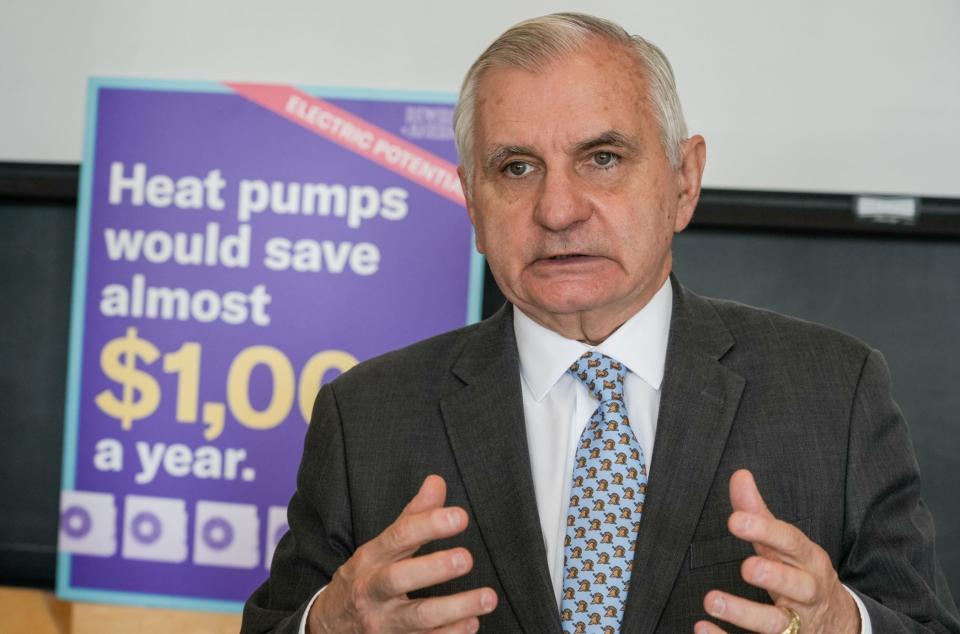Thinking of upgrading your heating system? Federal dollars on the way
CRANSTON — The biggest barrier people face in switching to electric heat pumps from heating systems that use natural gas or oil is the upfront cost.
Converting homes to high-efficiency heat pumps that rely on electricity rather than fossil fuels is considered an essential step to reduce greenhouse gas emissions and start to address the causes of climate change, but the purchase and installation of such devices can be around $10,000 or more.
The Biden administration’s Inflation Reduction Act, passed by Congress in August, aims to help remove that obstacle by channeling a record $370 billion in federal funding to clean energy technologies, including subsidies for new heating systems, as well as solar panels and electric cars, but, for the most part, people will have to apply for the incentives.
“It’s one thing to have these programs available,” U.S. Sen. Jack Reed said. “But if no one knows about it, it’s not going to make any difference.”

So on Monday Reed was at the Cranston headquarters of Taco Comfort Solutions, a manufacturer of heating and cooling systems, to get the word out about the potential savings available to Rhode Islanders and to talk about what he believes to be the broader benefits to the economy of transitioning from fossil fuels.
“Our goal today is to ensure that all Rhode Islanders know about and take advantage of this landmark law,” Reed said.
A look at potential savings through the new bill
What could a typical household save through the new programs that are set to be rolled out next year? It varies by zip code, home ownership status, income level and household size, but according to an online interactive calculator developed by the nonprofit Rewiring America, the money could be substantial.
For a homeowner in East Providence making $100,000 a year with a household of four people, the incentives could amount to $25,700, the calculator estimates.
That’s money that would come from many pots — discounts of up to 100% for heat pumps, as well as rebates for high-efficiency appliances and weatherization, along with tax credits for solar panels of 30% and up to $7,500 for electric cars. The more you spend, the more you qualify for.
What's the chance of a white Christmas?Here's why it may be more likely in 2022
The costs can still be substantial, but so too are the potential savings in energy costs, said Ari Matusiak, co-founder and CEO of Rewiring America, which advocates for electrifying energy systems.
For that East Providence home, upgrades funded by the IRA could reduce annual energy bills by $1,250 a year.
“That is an enormous amount of money when 49 percent of Americans don’t even have $400 in emergency savings,” Matusiak said.
How much funding is Rhode Island getting?
Rhode Island is guaranteed $64.8 million for energy upgrades through the IRA. That’s money broken into two programs that will be administered by the state, one for low- and moderate-income households for new electric appliances and heat pumps and the other for more general upgrades to improve energy efficiency such as new windows and insulation.
But state residents can also benefit by applying for additional incentives from federal programs created through the act.
Home heating accounts for about 19% of greenhouse gas emissions in Rhode Island. It’s the second-largest sector for emissions behind only transportation, which stands at 40%. Reducing the carbon footprint from heating is essential to meeting the state’s mandatory goal of reaching net-zero emissions by 2050.
Panel adopts plan for net-0 emissions:But some think it doesn't go far enough
But change will be difficult. About half of the homes in the state use natural gas and just under a third use oil. Only about a tenth of households currently use electricity for heat.
That, said Matusiak, is where the federal legislation comes in.
“The Inflation Reduction Act has effectively created a lot of electric potential for the State of Rhode Island,” he said.
The White House estimates that by tapping into the new energy funding and leveraging it with outside investment Rhode Island will see $4.1 billion in economic development between now and 2030.
Businesses like Taco are sure to benefit. The company has developed its first electric heat pump, which it calls “System M.” CEO Cheryl Merchant said the device is up to four times more efficient than a gas furnace. She expects Taco to hire up to 60 new employees to work on the new systems.
Does your town have a parking ban?Here's where to leave your car during a snowstorm in RI
Reed encouraged Rhode Islanders to keep an eye on the funding streams that will soon become available.
“At a time when energy prices are skyrocketing, these savings can make a huge difference to families in Rhode Island,” Reed said. “Ultimately, this is about families being able to reduce their costs and also help with an environmental crisis that we’re all facing.”
This article originally appeared on The Providence Journal: Federal funding to Rhode Island could reduce annual energy bills

